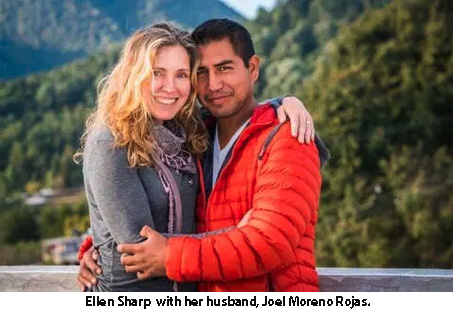Ellen Sharp left academia but got a husband and found ecotourism as her true calling
by Leigh Thelmadatter
About a decade ago, American Ellen Sharp tagged along with a writer friend to central Mexico. Little did she know that this would change her life.
When she could not accompany her friend on an interview, she decided to take one of the tours available in eastern Michoacán during the monarch butterfly season. As she says, she “hit it off” with the guide, who today is her husband, Joel Moreno Rojas.
Now, she didn’t decide to stay in Mexico right then and there. She returned to her PhD classes in Los Angeles, but she and Moreno kept in touch.
When it came time to do her dissertation, she took advantage of 21st-century technology and decided to move in with Moreno in town of Macheros, México state, during the butterfly season of 2013–2014.
But finishing her dissertation became a chore. She was studying violence, which contrasted deeply with the peaceful mountains surrounding a village that had far more farm animals than people. She found herself relieved when job opportunities in the States did not pan out.
She wondered why she could not simply find a way to stay here in the high mountains of the México state-Michoacán border, until she simply decided she had to.
Although Moreno spoke English well, his work with a regional hotel had long hours and little pay. He and his family owned land just outside the entrance to the Cerro Pelón Butterfly Sanctuary in Macheros.
Sharp wondered if they could somehow take advantage of this unknown reserve that still does not still appear on Google Maps. She imagined building a viable business.
The couple combined their complementary abilities — his construction skills and her ability to promote on the internet — and began by building a couple of rooms onto their house that they could rent, and even a cell phone tower to get more reliable internet access.
Sharp calls Moreno’s handyman skills “artistry.” Meanwhile, she built a bilingual website to promote the new business and take reservations.
They quickly found that their idea appealed mostly to a certain kind of tourist. They had exactly one Mexican guest. The rest were from the United States and Canada — with more than a passing interest in butterflies.
“People started coming, and people came happy and left happier. It’s just a really nice vibe to take people to see this incredibly beautiful thing in our sanctuary, which is super remote.”
Today, JM Butterfly B&B is the main promoter of the Cerro Pelón Butterfly Sanctuary and the main employer in Macheros. With a quieter and more intimate environment, it contrasts with larger sanctuaries. About 85% of Cerro Pelón’s visitors stay at the B&B. This differs from the more typical reserves, where most visitors are day-trippers or prefer to stay in more luxurious accommodations.
The bed-and-breakfast now has 14 rooms and even a pool and a yoga studio, but it has kept its classic rural Mexican home construction appeal. Cerro Pelón is an undiscovered gem, high enough to be above the tree line (hence the name “Bald Mountain”) with thick forests below. The butterflies winter at the lowest levels.
Other activities to be enjoyed here year-round include guided hikes, bird-watching, horseback riding and more. The couple receives guests from all over the world, but the base still remains those working with butterflies from publicly and privately funded researchers along with teachers in related fields.
It is a very loyal clientele. Last year, when the reserve closed because of the pandemic, so did the B&B. To survive, the business started an online magazine, selling subscriptions to former guests. Butterfly season returns this year, but the magazine remains active and is on their website.
The business has a social side as well. The Cerro Pelón Sanctuary was established in the 1970s. Locals knew of the butterflies but tried to keep them secret, fearing the loss of access to resources on the mountains. Their fears were justified, and that is exactly what happened when the land was expropriated.
This kind of conservation results in local opposition as well as activities such as illegal logging, a major problem in the México state-Michoacán border area. It is not that people here want to destroy the butterflies or the forest, Sharp says, but rather poverty drives them to do it.
The creation of jobs related to tourism helps this, although it is not enough. The couple began their own nonprofit organization, Butterflies and Their People in part because they became frustrated discovering every butterfly season seeing how many trees had been cut down during the rest of the year.
The organization pays for six full-time “forest guardians” whose salaries are covered by individual donations, mostly from former guests. With tourism down due to the pandemic, they have also organized webinars and meetings with conservation groups to share “what is happening on the ground,” something important because there is little accurate information of this kind.
Both the business and the nonprofit have made this spot an “international hub” for the butterflies of Cerro Pelón. But they are not content to sit on their laurels. They still want to reach out to more Mexicans and more foreigners who live in Mexico who care about butterflies and forests.
Leigh Thelmadatter arrived in Mexico 18 years ago and fell in love with the land and the culture in particular its handcrafts and art. She is the author of Mexican Cartonería: Paper, Paste and Fiesta (Schiffer 2019). Her culture column appears regularly on Mexico News Daily.



